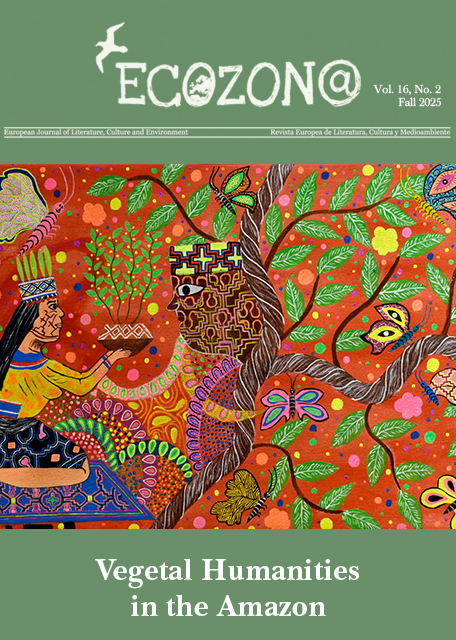A Dirty Hero’s Fight for Clean Energy: Satire, Allegory, and Risk Narrative in Ian McEwan’s Solar
DOI:
https://doi.org/10.37536/ECOZONA.2012.3.1.450Parole chiave:
Ian McEwan, Solar, Satire, Allegory, Risk NarrativeAbstract
In contrast to most other fictional texts treating ecological crisis, Ian McEwan's Solar (2010), celebrated as "the book on climate change," does not develop an apocalyptic scenario culminating in a collective catastrophe. Instead, while on the level of discourse mocking today's rhetoric of risk, it stages the disastrous personal risk management of its protagonist by use of satire. Whereas traditionally literary descriptions of natural disasters often function as allegories for social disasters, McEwan reverses this model by employing a private disaster to foreshadow a possible global catastrophe. The story can thus be read as satiric-allegorical risk narrative. On the one hand this concept is responsible for basic misunderstandings, on the other hand for praise as "the first climate-novel by an author of world-class quality." This essay first analyzes the protagonist's explicit reckoning with risk discourse, then unveils the satirical and allegorical dimensions of his own risk management to demonstrate the novel's aesthetic originality and the potential of this new form of eco-fiction.
Resumen
A diferencia de la mayoría de los textos de ficción que narran crisis écologicas, la novela Solar (2010) de Ian McEwan, celebrada como "el libro sobre el cambio climático", no esboza un escenario apocalíptico que culmina en una catástrofe colectiva. En lugar de eso, se burla a nivel del discurso de la actual retórica del riesgo, al mismo tiempo que pone en escena la desastrosa gestión de riesgos de su protagonista utilizando el género de la sátira. Mientras que las descripciones literarias tradicionales de desastres naturales funcionan a menudo como alegorías de desastres sociales, McEwan parece invertir este modelo empleando un desastre personal para anunciar una posible catástrofe global. La historia puede interpretarse como una narrativa satírico-alegórica de crisis. Por un lado, este concepto engendra malentendidos fundamentales , por otro lado genera elogios como "la primera novela sobre el clima de calidad mundial". Mi ensayo analiza en primer lugar de qué modo el protagonista maneja el discurso de riesgos para enfocar luego la dimensión satírico-alegórica de su propia gestión de riesgos que demuestra la originalidad estética de la novela y su potencial literario en el ámbito del género de la eco-ficción.
Downloads
##submission.downloads##
##submission.additionalFiles##
Pubblicato
Fascicolo
Sezione
Licenza
Authors who publish with this journal agree to the following terms:
a) Authors retain copyright and grant the journal right of first publication with the work simultaneously licensed under a Creative Commons Attribution License that allows others to share the work with an acknowledgement of the work's authorship and initial publication in this journal (CC BY-NC for articles and CC BY-NC-ND for creative work, unless author requests otherwise.
b) Authors are able to enter into separate, additional contractual arrangements for the non-exclusive distribution of the journal's published version of the work (e.g., post it to an institutional repository or publish it in a book), with an acknowledgement of its initial publication in this journal.
c) Authors are permitted and encouraged to post their work online (e.g., in institutional repositories or on their website) prior to and during the submission process, as it can lead to productive exchanges, as well as earlier and greater citation of published work (See The Effect of Open Access).










